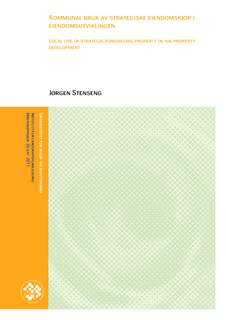| dc.description.abstract | Sammendrag
Formålet med denne oppgaven har vært å undersøke om kommuner bruker strategiske eiendomskjøp som et virkemiddel/verktøy for å påvirke eiendomsutviklingen i kommunen. Herunder har jeg undersøkt hvordan kjøp og salg av eiendom organiseres i kommunene. Jeg har også valgt å undersøke enkelte temaer som knytter seg til kjøp av eiendom. På bakgrunn av dette har jeg satt opp underproblemstillinger som går på om kommunene bruker eiendomsmassen de besitter som et forhandlingskort med utbyggere/utviklere og om de bruker eiendomsmassen sin strategisk.
Oppgaven er bygd opp i fire deler, med innledning, teori, intervjustudie og avslutning/analyse. Jeg har undersøkt fire kommuner på det sentrale Østlandet. Disse kommunene er Oslo, Asker, Bærum og Drammen. Det er gjennomført intervjuer med nøkkelpersoner i alle disse kommunene. Dette er personer som jobber i kommunenes eiendomsforvaltning og som er delaktige i kommunens eiendomsutvikling. Bakgrunnen for valget av kommuner er at dette er kommuner som har høy aktivitet og stort press fra utbyggere/utviklere, noe som kan gjøre at kommunene trenger flere virkemidler for å påvirke utviklingen enn andre steder.
Teorigrunnlaget i oppgaven er skrevet for å gi noen rammer rundt emnet jeg skriver om. Teorien er også tatt med for å kunne bruke relevant teori i fortolkningen av de resultater jeg har funnet. Oppgaven inneholder en god del forhandlingsteori. Bakgrunnen for dette er at denne teorien står sentralt i prosessen det er å kjøpe eller selge eiendom. Det at eiendomsmarkedet i stor grad er markedsstyrt, gjør også at forhandlingsteori er viktig.
Gjennom intervjuene i de ulike kommunene fant jeg ut at bruk av strategiske eiendomskjøp ikke blir brukt i særlig stor grad. Det er ulike årsaker til dette, men inntrykket er at økonomi og bruk av andre virkemidler, som plan- og bygningsloven, kan være noen av hovedårsakene. Alle kommunene jeg undersøkte peker på fordelene det er å eie eiendom i et utviklingsområde når de forhandler med utbygger/utvikler. Man kan da spørre seg hvorfor de ikke fører en mer aktiv oppkjøpspolitikk, når de er så klare på fordelen. Abstract
The purpose of this study was to investigate whether local authorities are using strategic purchasing property as an instrument / tool for influencing real estate development in the municipality. In my study, I examine how the purchase and sale of property is organized in municipalities. I also examined some issues relating to the purchase of property. Further, I have examined how the municipalities use the properties they possess as a bargaining chip with the builders / developers and if they use their properties in a strategic manner.
The thesis is structured in four parts: introduction, theory, interviews and analysis.
I have examined four municipalities in central Norway. These municipalities are Oslo, Asker, Bærum and Drammen. The study is conducted by interviews with key people in all these municipalities. These are people who work with government property development and are involved in the process of buying and selling property. The reason for the selection of municipalities is that these municipalities have high activity and pressure from the builders / developers, which can mean that they need more methods to influence developments than other places.
In order to interpret the results I have found, I have written a theoretical chapter to provide a framework for the subject I investigate in this thesis. The theory is also included in order to use relevant theory in the interpretation of the results I have found Negotiation theory is a central part of this chapter, because this theory is essential to the process of buying or selling property. The fact that the property market is largely market-driven also means that bargaining theory is important.
Through interviews in the various municipalities, I found that the use of strategic property purchases is not significant. There are various reasons for this, but my impression is that economy and the use of other instruments, such as the Planning and Building Act, may be some of the main reasons. All the municipalities I examined points to the benefits of owning property in a development area when they negotiate with the builder / developer. One can then ask why they do not lead a more active acquisitions policy, when they clearly see the benefit. | en_US |
